Unger wore #9 because veteran Pit Martin was also selected to play in the All-Star Game and, based on his greater seniority, wore his customary #7.
Monday, December 7, 2015
1972-73 St. Louis Blues Garry Unger Jersey
After playing the 1965-66 season with the Calgary Buffaloes of the Alberta Junior Hockey League, Garry Unger joined the London Nationals of the Ontario Hockey Association for the 1966-67 season where he led the team in scoring with 38 goals and 73 points in 48 games. With the Nationals season concluded, Unger played 2 games with the Tulsa Oilers of the Central Hockey League, scoring twice.
For the 1967-68 season, Unger first played for London in 2 games before spending 9 games back with the Oilers in Tulsa. His next stop was with the Rochester Americans of the American Hockey League, but only for 5 games before he was called up by the Toronto Maple Leafs of the NHL to fill in for an injured Dave Keon.
Unger broke into the NHL with Toronto
After playing 15 games for Toronto, which included scoring his first NHL goal, Unger was sent to the Detroit Red Wings in February as part of a blockbuster trade that also sent Frank Mahovlich, Pete Stemkowski and the rights to Carl Brewer in exchange for Norm Ullman, Paul Henderson, Floyd Smith and Doug Barrie. Unger was included in the trade in part because he refused to get a crew cut when ordered to by his coach in Toronto! Unger introduced himself to Detroit with 5 goals and 15 points in the final 13 games for Detroit, his fifth different club of the 1967-68 season!
Unger would play in all 76 of Detroit's games in 1968-69, scoring 24 goals and 44 points before erupting for a career high 42 goals in 1969-70 on his way to 66 points. His 42 goals were second in the NHL, just one back of Phil Esposito's 43.
Unger set a career high with 42 goals with Detroit
After scoring 13 goals in 51 games of the 1970-71 season, Unger and Wayne Connelly were traded to the St. Louis Blues in exchange for Red Berenson and Tim Ecclestone. The trade to St. Louis re-energized Unger, as he would score 29 points in 28 games with St. Louis after needing 51 games to score 27 in Detroit. Of note, based on the number of games the Red Wings and Blues had played at the time of the trade, Unger would end up playing in 79 games of the 78 game NHL season.
During his first full season with St. Louis, Unger led the club with 36 goals and 70 points, well clear of Frank St. Marseille's 52 points. He led the team in scoring again in 1972-73 with the second 40 goal season of his career with 41 goals and 80 points, 32 points better than Jack Egers and Gary Sabourin's 48.
As with many players in the mod 1970's, Unger's hair
changed dramatically from the time he broke into the league
Although Unger's point total dropped to 68 points in 1973-74, he still was the Blues point leader once again. That streak would reach for consecutive seasons when he had another 80 point season in 1974-75 as well as a career high 123 penalty minutes. Oddly, Unger would set a career high with 83 points from 39 goals and 44 assists in 1975-76 only to see his streak of leading the team in scoring end when Chuck Lefley bested him with 85 points. Despite this, Unger broke Andy Hebenton's NHL record for Most Consecutive Games Played on March 10th of that season, has Unger had never missed a game since being called up by the Maple Leafs back in 1968.
Despite a few close calls during the days when players did not wear helmets,
Unger set the NHL record for Most Consecutive Games Played
Unger was named captain of the Blues in 1976-77 and he again fell just short of leading the Blues in scoring that season when Bob MacMillan edged him by a single point 58-57. Although Unger's point total slipped to 52 in 1977-78, his lowest in ten seasons, it was enough to lead St. Louis in scoring for the fifth time. Following the NHL season, Unger made his international debut for Canada at the 1978 World Championships in Czechoslovakia where the Canadians came home with a bronze medal.
Unger was the Blues captain during 1976-77
Unger's ninth and final season with the Blues saw him score 30 goals and 56 points, his eighth consecutive 30 goal season, aided in part by his record setting durability. He also returned to the World Championships for a second consecutive season, scoring 2 goals and 3 points in 7 games.
Unger playing against his future team
Just prior to the 1979-80 season, Unger was traded to the Atlanta Flames for a package of two players and a 2nd round draft pick. The move to Atlanta was not the best for Unger, as his offensive game declined to just 17 goals and 33 points. Additionally, on December 22, 1979, Flames coach Al MacNeil benched Unger, ending his Iron Man streak at 914 consecutive games.
For the 1980-81 season, the Flames would relocate to Calgary, but Unger would not join them, as he was traded for the fourth time in his career, this time to the Los Angeles Kings in exchange for two players in June of 1980.
Unger during his only season with the Kings
Unger's time in Los Angeles was limited, as after 58 games he was sent to the Edmonton Oilers on March 10th.
Despite not scoring any points in the Oilers final 13 games of the 1980-81 season, Unger returned to Edmonton for 1981-82, but was limited to just 46 games, in which he scored 20 points. In his final NHL season, Unger played 16 games for Edmonton, scoring 2 goals, as well as 8 games for the Moncton Alpines of the AHL.
Unger finished his NHL career with the Oilers
After two seasons away from the game, Unger took to the ice again when he joined the Dundee Rockets of the British Hockey League for the 1985-86 season. Showing no signs of his 38 years of age, Unger scored 86 goals (yes, eighty-six) to lead his club and 134 points in the wide open BHL, as his stellar point total was not even enough to lead his own team!
Having enjoyed his first season in the BHL, Unger joined the Peterborough Pirates for the 1986-87 season and lit up the league with 95 goals and 238 points, with his 143 assists leading the league and his 95 goals fourth as he placed second in the scoring race just 4 back of the leader's 242.
Unger played one final season with the Pirates as a player coach, scoring 37 goals and 81 points before finally retiring for good as a player.
His final NHL totals were 1,105 games played with 413 goals and 391 assists for 804 points as well as 1,075 penalty minutes. Additionally, Unger appeared in the NHL All-Star Game seven consecutive seasons from 1972 through 1978 and was MVP of the game in 1974.
Today's featured jersey is a 1972-73 St. Louis Blues Garry Unger jersey as worn during his only 40 goal season with St. Louis when he scored 41.
The Blues arrived in the NHL during the great expansion of 1967-68 and 1972-73 was the final season for their original blue jersey style, as the colors of the sleeves would be reversed for 1973-74 after six seasons of use.
Bonus jersey: Today's bonus jersey is a 1973 NHL All-Star Game Garry Unger jersey as worn during Unger's second of seven consecutive NHL All-Star Games.
This jersey style was first introduced for the 1973 game and had a long run with it's white counterpart, being used eight times through the 1981 game, save for 1979 when the traditional All-Star Game was not held owing to the NHL All-Stars taking on the Soviet Union for a pair of games known as Rendez-vous '87.
Unger wore #9 because veteran Pit Martin was also selected to play in the All-Star Game and, based on his greater seniority, wore his customary #7.
Unger wore #9 because veteran Pit Martin was also selected to play in the All-Star Game and, based on his greater seniority, wore his customary #7.
Extra bonus jersey: Today's extra bonus jersey is a 1978 Canada National Team Garry Unger jersey as worn during Unger's first of two World Championship appearances for Canada.
This is certainly one of the more unusual styles of jerseys worn by Canada, it's multicolored psychedelic maple leaf logo in particular. This style of jersey was worn by Canada first in 1977 when they returned to the international scene after seven seasons away in protest of the rules on amateurism, which they felt had tilted the ice in favor of the Soviet Union in particular.
This style was worn for three World Championships, with the last being in 1979.
Today's video section begins with a career highlight video created for Unger being enshrined in the St. Louis Sports Hall of Fame.
Next is Unger discussing his return to St. Louis for a Salute to #7 on March 7, 2011.
Labels:
Canada,
NHL All-Star Game,
St. Louis Blues,
Unger Garry
Subscribe to:
Post Comments (Atom)


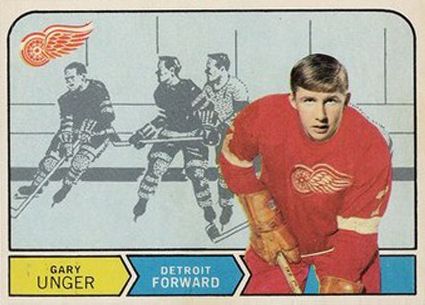
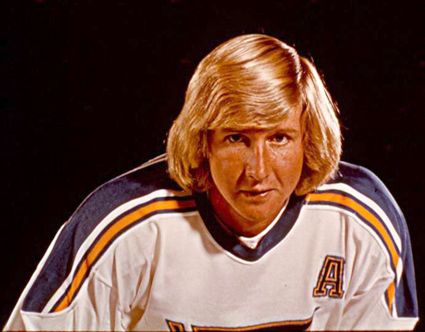
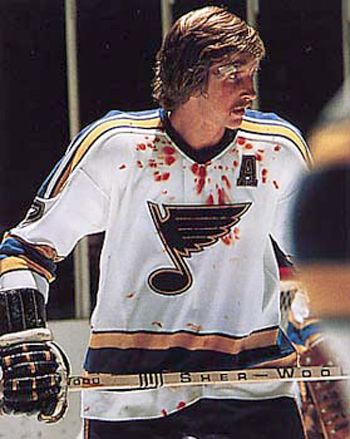
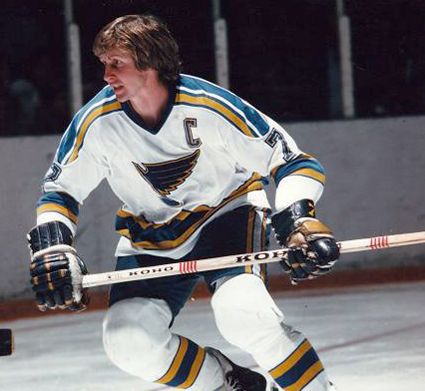
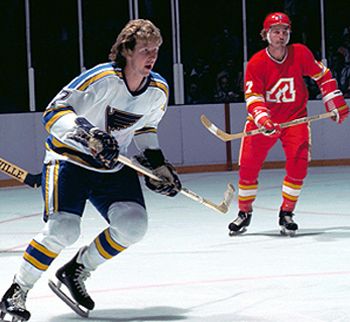
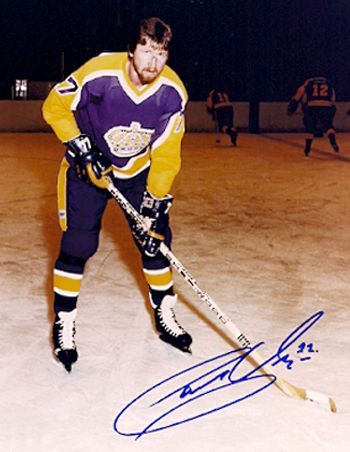


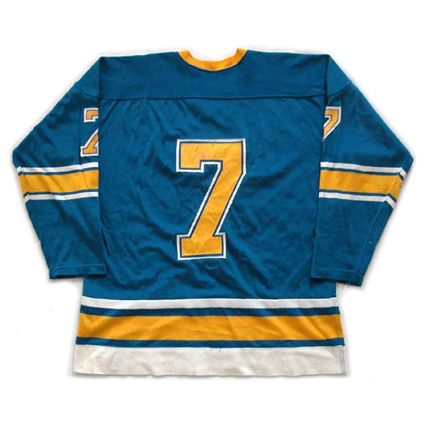
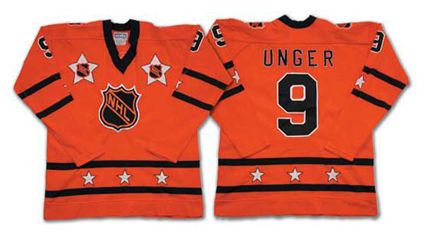
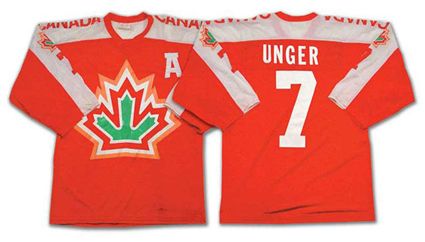










No comments:
Post a Comment
We welcome and encourage genuine comments and corrections from our readers. Please no spam. It will not be approved and never seen.